This summer, Jack Lipinsky, along with 10 other Facing History and Ourselves teachers from Jewish day schools around North America, participated in a week-long study trip to central Poland. The trip was led by Facing History’s Director of Jewish Education Jan Darsa. It was sponsored by Polish non-profit The Forum for Dialogue Among Nations. His experiences, in particular his visit to the town of Pińczów, impacted him greatly.
Topics: Choosing to Participate, History, We and They, Culturally Responsive and Relevant Pedagogy, In the news, Personal history, reflection
I don't know much about the history of my dad’s family. I used to think that this was because there was not much known. I'm beginning to think differently. What I know about my dad’s side of the family is that my Zaida (grandpa) came in 1920 from what was then Ukraine (now Belarus) as a refugee via a camp in Romania. My Baba (grandma) came in 1914 as an immigrant with her aunt’s family from Ukraine, near Kiev. The legend of the family is that they were on the last boat before World War 1 broke out. My Zaida was a refugee from the same war that my Baba narrowly avoided. I know that after marrying, my Zaida served in World War II before starting a family. He had three children; two daughters and my father. There weren’t too many other details that I knew, especially about the family pre-World War II.
Topics: Choosing to Participate, Identity, History, legacy, Personal history, reflection
We know that it's not easy to teach about the Holocaust and genocide. For many the topic is very difficult and many students cannot wrap their heads around the scope and magnitude of how these mass murders could occur, particularly about the idea of how an entire nation could allow horrific events like this to happen. Creating that safe, caring classroom is essential in being able to have these difficult lessons. In a middle school classroom, these are essential conversations, as students at this age care and have a strong sense of fairness and justice.
Topics: Facing History Resources, History, Regent Park, Middle School, We and They, Strategies, Lesson Ideas, Holocaust and Human Behaviour, Social Justice
As the end of each school year draws near, I feel a great deal of frustration. As students are overwhelmed with culminating assignments or the decisions that they made about completing school work for the previous 9 months, the demands on the teacher expand exponentially as well. As I work with the Growing Success system and school programs such as student success and credit rescue, I struggle to ensure that the decisions that I make maintain the integrity of the course, give students the opportunities they deserve or need, and maintain the intent of the ideals of character education. I find this overwhelming.
Topics: Choosing to Participate, History, Genocide and Crimes Against Humanities Course, Holocaust and Human Behaviour, CHG
As you may have read in other blogs, the “Stand Up, Speak Out” event was an incredible evening of sharing and community. For me it served to exemplify, and personify, the Scope and Sequence of Facing History and Ourselves. On that evening, half a dozen of my students took the stage along with students from three other southern Ontario schools to perform their spoken word pieces. The performances were broken down into the five steps of the Facing History Scope and Sequence:
Topics: Choosing to Participate, Facing History Resources, Identity, History, Urban Education, project, We and They, Strategies, Culturally Responsive and Relevant Pedagogy, genocide, legacy, Genocide and Crimes Against Humanities Course, Holocaust and Human Behaviour, CHG, reflection
Today, former South African President and civil rights leader Nelson Mandela turns 95. In honor of his birthday, citizens around the world are donating 67 minutes of their time to the greater good in honor of the 67 years Mandela dedicated to public service.
If you are donating 67 minutes today, we’d love to hear what you’re doing.
I wanted to do my 67 minutes – theoretically, shouldn’t we do this every day? – but when I started thinking of what to do, I struggled. I often think that my work as a program associate for Facing History is contributing to the greater good. In fact, I think of teachers in schools worldwide as leading lives of public service. So aren’t we, I thought, kind of exempt from such calls to action?
But that feels too easy, (and a bit lazy). So let me ask you, as teachers, are we living lives of public service and, if so, to what aims? What would it look like if we were to commit 67 minutes of our classroom time to public service in a way that would truly honour Mandela?
With that frame in mind, I wonder if we teach and interact in a way that promotes the respect and freedom of students? Do we as educators actively promote peace, integrity, and conscience in our students? Do we fight for equality amongst our colleagues? Do we structure our classrooms and schools to promote harmony and provide equal opportunities for all our students?
And when we speak about Mandela (if that’s how we choose to honour him in our 67-minute class), how do we connect him to our students so that they see him in the monumental way that he spoke to our generation? When we speak about his legacy and his aims, do we address the inequities, the racism, the unofficial apartheids that exist in our communities, or the violence that continues today?
How will you use your 67 minutes of Nelson Mandela-inspired service?
_________________________________________________________________________
Topics: Choosing to Participate, legacy, In the news
Human Resources: Holocaust and Human Behaviour Summer Seminar
Posted by Michael Grover on June 28, 2013
As an educator I have found that FHAO’s greatest resources are their human resources. Over the past few years I have been very fortunate to get to know each of the members of the Toronto Office, and as such have found a wealth of knowledge and support through them that I have been able to bring into my classroom. The Toronto Office runs a variety of workshops (such as the Bully Film Workshop, Literature Workshop, and the Facing History Urban Education Workshop, to name a few) that I have found invaluable in my personal and professional development. They run workshops that are immediately relevant to both our curriculum and our students. They deliver the information in pedagogically relevant ways, modelling wonderful new and creative tools and strategies as they take us through new and interesting (and though sometimes disturbing, frequently uplifting!) content.
Topics: Professional Development, Facing History Resources, Holocaust and Human Behaviour
Finding space to create movement in our lessons is important for our kinesthetic learners. If we do not find ways to engage them, we can expect to lose them. Moreover, movement is important for all students. It wakes them up, energizes them, and an alert student is more likely to learn. What follows is a lesson that was developed with the help of Jasmine Wong, program associate for the Toronto Office of Facing History and Ourselves. It relies on the use of the Gallery Walk, thus getting students up and moving. The lesson was designed specifically to meet the expectations of locally developed Genocide and Crimes Against Humanities course, CHG38 (see expectations as listed in the Human Zoos Lesson plan), but can be tailored to most History courses.
Topics: History, Racism, We and They, Lesson Ideas
We always say that Canada is a young country, but that never hits home till you come to Europe. Here I am in Krakow, the old imperial capital of Poland, whose existence is first mentioned by a Jewish merchant in 965 CE. A city gradually grew on this important trade route near the important salt mines of Bochnia, which would eventually account for 30% of Poland's national income in the 15th and 16th centuries.
Topics: History, Memorial, Genocide and Crimes Against Humanities Course
As educators, we want the answers as to why our students aren't learning. Do they have special education needs such as a learning disability? Are they lacking motivation? Did they get enough sleep the night before? Did they have breakfast? But how many of us ever ask: do my students feel safe? Overwhelming brain based research indicates the importance of students feeling safe in schools in order for them to be able to learn.
Topics: Urban Education, Middle School







